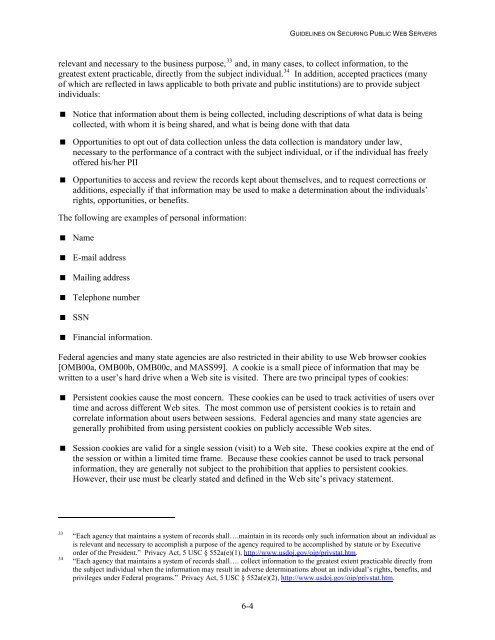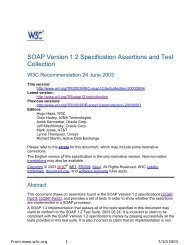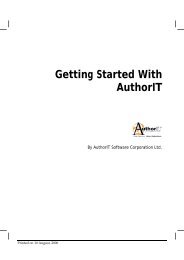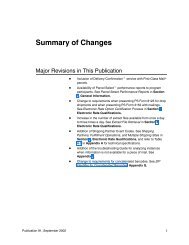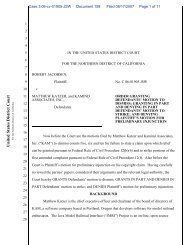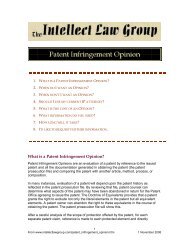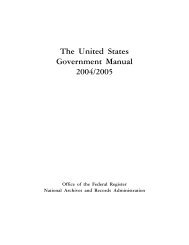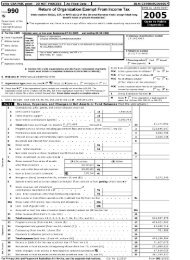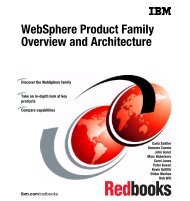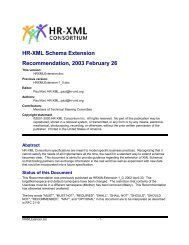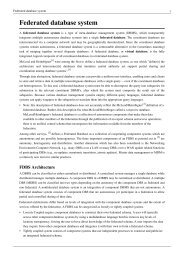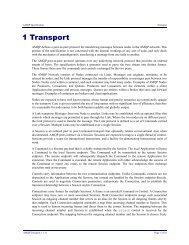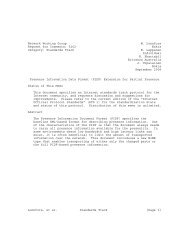NIST 800-44 Version 2 Guidelines on Securing Public Web Servers
NIST 800-44 Version 2 Guidelines on Securing Public Web Servers
NIST 800-44 Version 2 Guidelines on Securing Public Web Servers
You also want an ePaper? Increase the reach of your titles
YUMPU automatically turns print PDFs into web optimized ePapers that Google loves.
GUIDELINES ON SECURING PUBLIC WEB SERVERS<br />
relevant and necessary to the business purpose, 33 and, in many cases, to collect informati<strong>on</strong>, to the<br />
greatest extent practicable, directly from the subject individual. 34 In additi<strong>on</strong>, accepted practices (many<br />
of which are reflected in laws applicable to both private and public instituti<strong>on</strong>s) are to provide subject<br />
individuals:<br />
Notice that informati<strong>on</strong> about them is being collected, including descripti<strong>on</strong>s of what data is being<br />
collected, with whom it is being shared, and what is being d<strong>on</strong>e with that data<br />
Opportunities to opt out of data collecti<strong>on</strong> unless the data collecti<strong>on</strong> is mandatory under law,<br />
necessary to the performance of a c<strong>on</strong>tract with the subject individual, or if the individual has freely<br />
offered his/her PII<br />
Opportunities to access and review the records kept about themselves, and to request correcti<strong>on</strong>s or<br />
additi<strong>on</strong>s, especially if that informati<strong>on</strong> may be used to make a determinati<strong>on</strong> about the individuals’<br />
rights, opportunities, or benefits.<br />
The following are examples of pers<strong>on</strong>al informati<strong>on</strong>:<br />
Name<br />
E-mail address<br />
Mailing address<br />
Teleph<strong>on</strong>e number<br />
SSN<br />
Financial informati<strong>on</strong>.<br />
Federal agencies and many state agencies are also restricted in their ability to use <strong>Web</strong> browser cookies<br />
[OMB00a, OMB00b, OMB00c, and MASS99]. A cookie is a small piece of informati<strong>on</strong> that may be<br />
written to a user’s hard drive when a <strong>Web</strong> site is visited. There are two principal types of cookies:<br />
Persistent cookies cause the most c<strong>on</strong>cern. These cookies can be used to track activities of users over<br />
time and across different <strong>Web</strong> sites. The most comm<strong>on</strong> use of persistent cookies is to retain and<br />
correlate informati<strong>on</strong> about users between sessi<strong>on</strong>s. Federal agencies and many state agencies are<br />
generally prohibited from using persistent cookies <strong>on</strong> publicly accessible <strong>Web</strong> sites.<br />
Sessi<strong>on</strong> cookies are valid for a single sessi<strong>on</strong> (visit) to a <strong>Web</strong> site. These cookies expire at the end of<br />
the sessi<strong>on</strong> or within a limited time frame. Because these cookies cannot be used to track pers<strong>on</strong>al<br />
informati<strong>on</strong>, they are generally not subject to the prohibiti<strong>on</strong> that applies to persistent cookies.<br />
However, their use must be clearly stated and defined in the <strong>Web</strong> site’s privacy statement.<br />
33<br />
34<br />
“Each agency that maintains a system of records shall….maintain in its records <strong>on</strong>ly such informati<strong>on</strong> about an individual as<br />
is relevant and necessary to accomplish a purpose of the agency required to be accomplished by statute or by Executive<br />
order of the President.” Privacy Act, 5 USC § 552a(e)(1), http://www.usdoj.gov/oip/privstat.htm.<br />
“Each agency that maintains a system of records shall…. collect informati<strong>on</strong> to the greatest extent practicable directly from<br />
the subject individual when the informati<strong>on</strong> may result in adverse determinati<strong>on</strong>s about an individual’s rights, benefits, and<br />
privileges under Federal programs.” Privacy Act, 5 USC § 552a(e)(2), http://www.usdoj.gov/oip/privstat.htm.<br />
6-4


